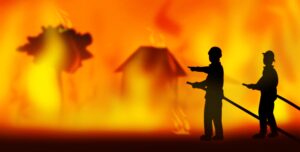
PCC and the Los Angeles Wildfires
Some of our readers may not know that Pasadena City College (PCC) sits just a few miles from the southern evacuation perimeter of the Eaton fire. Our campus has seen firsthand the devastation of this fire and the chaos it has created in our very tight-knit community. Our hearts go out to our neighbors, colleagues, friends, and family affected by this circumstance. PCC will do all that it can to aid its community as it works through this crisis and begins its healing process.
In this edition of the Pulse, we are sharing some of the resources and responses to the fires that have emerged in the last week. Health services, housing, transportation, and even pet care are all critical concerns for the thousands of Los Angeles residents affected by the blazes. The agencies that offer these and other critical services are available and coordinating support opportunities to any Angelino affected by the infernos.
PCC-Centered Resources
Pasadena City College is located at the heart of the wildfire resource network and is hosting several agencies that are providing support and resources for fire victims and survivors. If you have suffered losses due to the fires, these entities may have the resources you’ll need to move forward. You can contribute to the PCC Community Relief Fund if you’d like to help those in need because of the fires.
Free Childcare
First responders, essential workers, and Impacted families with eligible children can find free emergency childcare on the PCC campus through the services of the YMCA of Metropolitan Los Angeles. The facility is located at Harbeson Hall (enter on the backside of the L Building that faces Colorado Boulevard) and can take in children four years, nine months or older, and be in grades TK through 8th. The general community can go here to enroll; PCC Parents can enroll through this link.
Mental Health Support
The Circadian (found on campus in CC Building, Room 130) is hosting mental health support services on Friday, January 17 from noon to 2:30 pm. Find more information here.
Small Business Support – PCC Small Business Development Center and Women’s Business Center
The Small Business Administration is providing a Disaster Loan Outreach Center for small companies, private non-profits, and other organizations that have sustained economic losses due to the fires. Located on the PCC campus in the Continuing Education Center Bungalow – B4, the entity is now open Mondays through Fridays, 9 am – 6 pm, and Saturdays, 9 am 4 pm.
The LA SBDC has also prepared this comprehensive Disaster Response Guide that links to many response efforts throughout the region and will be updated regularly as needed.
As well, keep an eye on the PCC Women’s Business Center, which tailors its support service to businesses owned and operated by women.
Help Us Identify Unmet Needs
The PCC community – students, faculty, staff, families, and neighbors – can help the school identify as-yet-unidentified needs by submitting a PCC Fire Recovery Needs Assessment Form. Input received directly from those who the crisis has impacted will help us to better serve them and those who will follow in their footsteps.
Additionally, stay informed of what’s happening and what you can do about it by tracking available and evolving resources and staying current on emerging situations. Sign up for RAVE to receive updates and alerts on what’s happening at PCC.
LA County Wildfire Response Resources
LA County has leveraged many resource services in response to the fires, as almost 92,000 of its residents are currently under mandatory evacuation orders, and another 89,000 have been warned to prepare to leave their homes. These agencies are offering support:
For shelter and Lodging:
• 211 LA has joined with Airbnb to provide emergency temporary shelter for displaced LA residents. To start that process, complete this form.
• The LA Homeless Services Authority advises that several county agencies are offering help to people seeking shelter, including:
o Red Cross Los Angeles,
o the local hotel association, and
o the YMCA of Metropolitan LA, among many others.
Search here for those and additional services offered by local and county companies and businesses.
Addition County Resources:
Unique situations may need other support. Check out this directory to find these and other agencies that may be able to help you:
• Los Angeles County Department of Aging and Disabilities
• Los Angeles County Department of Animal Care and Control
• Los Angeles County Department of Assessor’s Office
• Los Angeles County Department of Child Support Services
• Los Angeles County Department of Consumer and Business Affairs
• Los Angeles County Department of Economic Opportunity
• Los Angeles County Department of Mental Health
California State Wildfire Response Resources
Meanwhile, in California, Governor Gavin Newsom has launched a new website, CA.gov/LAfires, that offers resources at the state level for damages and losses caused by these catastrophes. Here, you can find other available resources, as well as locally situated support options, including:
• evolving fire maps,
• employment and unemployment benefits,
• tips and alerts for developing concerns, and
• possible tax relief options.
In the LA area, a variety of service organizations have emerged to respond immediately to the needs of survivors of the fires. For those who have lost housing, the California Governor’s Office of Emergency Services (Cal OES) has opened two Disaster Recovery Centers in Los Angeles County. As of Tuesday, January 14, these shelters and services are available to victims of the fires
• The UCLA Disaster Recovery Center is located at 10850 West Pico Blvd., Los Angeles, CA 90064.
• The Pasadena Disaster Recovery Center is located at Pasadena City College in the Community Education Center, 3035 E. Foothill Blvd., Pasadena, CA 91107.
Both recovery centers are open Monday through Sunday from 9 AM to 8 PM. Providing support service services through the centers are California’s:
• Department of Motor Vehicles,
• Department of Social Services,
• Franchise Tax Board,
• Employment Development Department,
• Contractor Estate License Board,
• Department of Insurance,
• Department of Tax and Fee Administration,
• Department of Veterans Affairs,
• Department of Public Health, and
• Department of Housing and Community Development.
If seeking services at either Disaster Recovery Center, be sure to bring with you:
• the address of the damaged primary residence,
• your current phone number and mailing address,
• your bank account information, and
• your insurance coverage information.
Other resources available through California’s government can be found at ca.gov/LAfires/. A list of resources can be downloaded in both English and Spanish to help victims of the fire find needed resources, including:
• Advanced financial assistance,
• Funds for repair or replacement of a damaged home,
• Disaster-related legal services,
• Disaster-related employment assistance,
• Housing and rental assistance,
• And any other needs not listed.
Additionally, victims can find assistance finding shelter and filing insurance claims, and there is a helpful list of tips for wildfire claimants that may prove vitally important.
Federal Resources
President Joe Biden’s declaration that the LA fires constitute a ‘Major Disaster‘ makes victims and survivors of those fires eligible for federal programs based on the unique types and extent of damage they suffered. To apply for federal assistance from FEMA, the Federal Emergency Management Agency, follow these procedures:
- Click on DisasterAssistance.gov/DAC-RI/assessment,‘ and hit the ‘apply’ button on the website page. Your responses to those questions will determine whether your emergency qualifies for federal aid.
- Once your qualification is established, create an account on login.gov to establish your presence with the FEMA agency.
- Be prepared to provide necessary data to the agency, including:
- your home, mailing, and email addresses
- your phone number;
- your Social Security number;
- your immigration or citizenship status, if applicable,
- your banking information, and
- your insurance information.
- Enter the data into the application form and describe the circumstances of your particular emergency. Add as much data as possible, but know that you can amend your application later as new information becomes available.
- Once you’ve created the application, save it to your computer and be sure to capture your application identification number. FEMA agency will ask for that number every time they talk to you.
When received, FEMA will review your application and contact you if they need more information. You can also log back in at any time to check your status and to determine if there’s anything else you need to provide. Once you do qualify, FEMA will send you a payment using the method you provided.
If you’ve lost your business or your company has been adversely affected, you can seek disaster assistance from the Federal Small Business Administration (SBA). For the California wildfires, the SBA is providing financial aid to cover several types of damage and injuries. Loans available from the SBA include:
- Home loans for homeowners or renters to repair or replace disaster damage with damaged l estate and personal property, including cars.
- Economic Loans to cover financial injuries:
- Disaster loans from the SBA provide working capital to help businesses, agricultural, cooperative, aquaculture agencies, and most private nonprofit organizations meet their ordinary and necessary obligations.
- Physical disaster loans are available to businesses to repair or replace corporate property, including real estate, supplies, machinery, inventory, and equipment.
All sized agencies are eligible for the support, including private nonprofit organizations, churches, private universities, charities, etc. For more information about federal government disaster support services, go to fema.gov/disaster/4856.
The fires and aftermath will fundamentally alter California, Los Angeles City and County, and the City of Pasadena. PCC is a witness to what’s transpired to date and will be working with its neighbors and colleagues as our community quells the immediate threats and looks forward to building a stronger, more resilient future.


